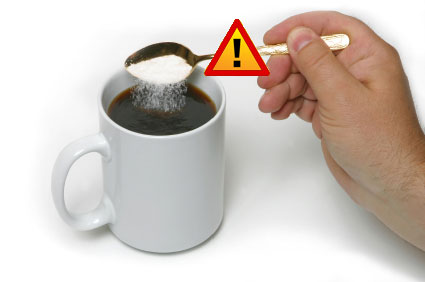Think twice before dumping that Splenda into your coffee…
The safety rating of the little yellow packet has gone from “safe” to “caution.” But it wasn’t the FDA who finally spoke up. Another agency has stepped in.
The Center for Science in the Public Interest (CSPI) downgraded Splenda’s safety rating because of a new discovery. We’re shocked that it took a “new discovery” to sound the alarms. But it’s better than nothing.
| Gross but true… Sucralose (Splenda) was actually discovered by researchers while trying to create a new insecticide. You will find Splenda in numerous consumer products. Make sure to check labels for sucralose. Not to be confused with sucrose, actual table sugar. Products that include Splenda are some Arizona Iced teas, some diet sodas, Diet V8 Splash, Gatorade, Ocean Spray juices, Tropicana juices, and even Breyers ice cream. |
The Food and Drug Administration approved Splenda–sucralose—in 1998. Since then, it’s come under a ton of scrutiny. And for good reason.
Manufacturers created Splenda because everyone finally realized that other artificial sweeteners are dangerous. But what was the point? Splenda actually has more of a toxic chemical—chlorine—than even aspartame.1 Yet aspartame has an “avoid” rating.2
And that’s not all. When you look at effects, there isn’t much of a difference between the two sweeteners. Headaches…blurred vision…short-term dizziness. Splenda even causes depression and weight gain.
This “healthy” sweetener wrecks your digestive system too… It kills off healthy bacteria in the stomach. The good bacteria fights off harmful invaders and helps prevent irritable bowel syndrome or other stomach disorders.
Now, a new study has revealed much more about the so-called “healthy” sugar alternative. And it’s worse than we thought.
We think this newly discovered side effect deserves more than just a “caution” label…
Cancer…leukemia…These are deadly diseases that a mere “caution” label doesn’t quite cover.
In the study, Splenda caused leukemia in mice.3 And even worse…during the study they developed leukemia from the sucralose exposure even before birth.
These are still unpublished findings. But once they’re proven, Splenda will be considered a carcinogen. The National Toxicology Program will then add it to their annual Report on Carcinogens. Poisons like tobacco, lead, and Sweet ‘N Low, are already on the list. It’s good to know. There’s just one problem. The FDA still hasn’t banned or even controlled the carcinogens in the report.
Splenda’s already proven to damage DNA. Damaged DNA alone can cause cancer. It may currently only have a “caution” rating but we suggest you put it on your own “avoid” list.
There are safe, natural sugar alternatives. Coconut sugar, raw honey, molasses, and date sugar are just a few.4 Coconut sugar has the same amount of carbs as regular sugar. But it’s much lower on the glycemic index scale. And it has some fiber to slow down absorption a bit.
When consuming any type of natural sugar—even “healthy” sugars—you have to be careful. 70 percent of Americans have some form of diabetes or pre-diabetes. And in the June issue of Natural Health Dossier, we give you the sugar balance strategy that could save your life—whether or not you have diabetes. To get smart solutions to all your health concerns, join Natural Health Dossier. You’ll be able to use the “sugar balance strategy” immediately. Go HERE to sign up.
Like this Article? Forward this article here or Share on Facebook.
References:
1 http://naturalsociety.com/is-splenda-safe-examining-dangers-sugar-alternative/
2 http://news.msn.com/us/splenda-goes-from-safe-to-caution-after-leukemia-found-in-mice#tscptmf
3 http://medicaldaily.com/articles/16470/20130612/splenda-side-effects-carcinogen-leukemia-unhealthy-sweeteners-artificial-sweeteners.htm
4 http://institutefornaturalhealing.com/2013/05/five-healthy-and-natural-sugar-alternatives/

